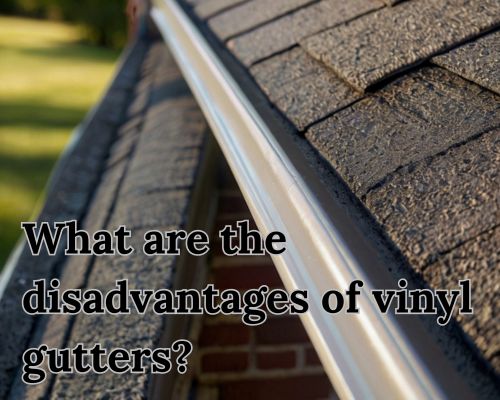
What Are the Disadvantages of Vinyl Gutters? A Florida Homeowner’s Guide
What Are the Disadvantages of Vinyl Gutters? A Florida Homeowner’s Guide
Vinyl gutters have become a popular choice for homeowners in Florida due to their affordability and ease of installation. However, while they may seem like an attractive option, there are several disadvantages that Florida homeowners need to consider before making a decision. With Gutters Of West Palm Beach, we’ll explore the drawbacks of vinyl gutters and why they may not be the best choice for homes in Florida’s hot and humid climate.

1. Durability Concerns in Florida’s Extreme Weather
One of the primary disadvantages of vinyl gutters is their lack of durability, especially in Florida’s climate. Unlike aluminum or copper gutters, vinyl gutters are susceptible to cracking, warping, and brittleness due to prolonged exposure to the sun’s intense UV rays. Florida experiences high temperatures for most of the year, and this extreme heat can cause vinyl to deteriorate faster than in cooler climates.
Additionally, during Florida’s hurricane season, heavy rain and strong winds can put significant stress on gutters. Vinyl gutters are lightweight and less rigid, making them prone to damage or even detachment during storms. Homeowners in hurricane-prone areas such as Miami, Tampa, and Orlando may need to replace vinyl gutters more frequently compared to more durable materials like aluminum or steel.
2. Limited Weight-Bearing Capacity
Another major drawback of vinyl gutters is their low weight-bearing capacity. Unlike metal gutters, vinyl can sag or collapse under heavy rainfall, which is a significant concern in Florida where tropical storms and heavy downpours are common. Cities like Jacksonville and Fort Lauderdale experience high precipitation levels, and vinyl gutters may not be able to handle the volume of water efficiently. This can lead to overflow, water pooling near the foundation, and potential structural damage to the home.
3. Shorter Lifespan Compared to Other Materials
Vinyl gutters typically last between 10 to 20 years, whereas aluminum and copper gutters can last up to 50 years or more with proper maintenance. Given Florida’s harsh sun, frequent rain, and salt air (especially in coastal cities like Miami and Sarasota), vinyl gutters tend to degrade more quickly.
The constant exposure to moisture and humidity also makes vinyl gutters more prone to mold, mildew, and algae buildup, which can affect their functionality and appearance over time. Homeowners looking for long-term solutions may find that vinyl gutters require more frequent replacements, leading to higher costs in the long run.
4. Susceptibility to Cracking and Warping
Vinyl gutters are made of PVC (polyvinyl chloride), a material that expands and contracts with temperature fluctuations. In Florida, where temperatures can soar above 90°F in summer and drop during occasional cold fronts, this constant expansion and contraction can cause gutters to crack or warp over time.
Once cracks appear, leaks become a significant issue, leading to water damage on roofs, siding, and foundations. Unlike aluminum or copper, which can withstand temperature changes more effectively, vinyl is more fragile, making it a less reliable choice for Florida homeowners.
5. Aesthetic and Curb Appeal Limitations
While vinyl gutters come in a variety of colors, they tend to fade quickly under prolonged sun exposure. Florida homeowners who invest in vinyl gutters may find that their gutters lose their original color and appear dull or discolored within a few years.
Additionally, vinyl gutters lack the high-end aesthetic appeal of materials like copper or steel, which can enhance a home’s curb appeal. If you’re considering selling your home in cities like Naples, Boca Raton, or Palm Beach, investing in higher-quality gutters may provide better long-term value and attractiveness to potential buyers.
6. Limited Customization and Repair Challenges
Unlike aluminum or steel gutters, which can be custom-cut and professionally installed, vinyl gutters typically come in pre-made sections that need to be snapped together. Over time, these joints can weaken, leading to leaks and separations—especially after heavy rainfall or strong winds.
Moreover, once vinyl gutters crack or break, repairing them can be difficult. Unlike metal gutters, which can often be patched or welded, vinyl sections usually need complete replacement, adding to long-term costs. Homeowners in Florida who want a low-maintenance, long-lasting gutter system may find that metal alternatives provide better durability and ease of repair.
7. Environmental Concerns
Vinyl gutters are made from PVC, a type of plastic that is not biodegradable. While they may be a budget-friendly option, they are not the most environmentally sustainable choice. When disposed of, vinyl gutters contribute to plastic waste, and their production involves chemicals that can have environmental impacts. For Florida homeowners concerned about sustainability, aluminum or copper gutters, which are recyclable, may be a more eco-friendly alternative.
See Gutters Of West Palm Beach for more.
Conclusion: Are Vinyl Gutters Right for Florida Homes?
While vinyl gutters may seem like an attractive option due to their affordability and ease of installation, their disadvantages outweigh their benefits in Florida’s climate. The combination of extreme heat, heavy rainfall, and frequent storms makes durability and longevity key factors in selecting the right gutter system.
For homeowners in Florida cities like Miami, Orlando, and Tampa, investing in more durable options such as aluminum, steel, or copper can lead to long-term savings, reduced maintenance, and better protection against water damage. Before choosing vinyl gutters, consider the climate-specific challenges and weigh the costs of frequent repairs and replacements.
If you’re looking for a long-lasting and weather-resistant gutter system, it’s best to explore alternatives that can withstand Florida’s unique environmental conditions while providing better performance and value over time.